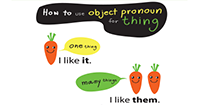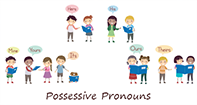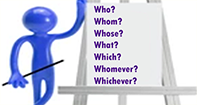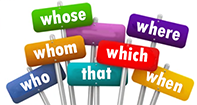Change Avatar
Relative Pronouns
Relative Pronouns
Relative pronouns will remind you of question words, but instead they are used to give specificity within a sentence when they join two different clauses together. In this case, the pronoun in the second clause refers to and modifies or describes the noun or pronoun in the first clause.
The most common relative pronouns are who, whom, whose, which, and that, but sometimes when and where can function this way as well.
When Do You Use Relative Pronouns?
The tricky bit here is that each relative pronoun works a bit differently as far as meaning within a sentence, so it’s best to review them in action to see how they function.
Take a look at the examples below.
| Relative Pronoun | How Is It Used? | Example Sentence |
|---|---|---|
| who | Replaces subject pronouns (people) like I, he/she, we, & they | It was my brother who caused the damage. |
| whom | Replaces the object pronouns me, her, & him | The lady whom they saw on the corner yesterday has disappeared. |
| whose | Indicates possession/ownership | This is the teacher whose students love her the best. |
| which | Used for objects/animals (non-defining clauses) | The pigeons, which are constantly hungry, are always hopping about the streets. |
| that | Used for people/things (defining clauses) | The picture frame that always sits on my desk was broken. |
| when | Introduces clauses where the noun indicates a time | There was a moment when time stood still during the race. |
| where | Introduces clauses where the noun refers to a place | I want to visit the Hawaiian island where the volcano erupted. |
QUICK TIP!
It’s often easy to find a relative pronoun within a sentence because they always come directly after the noun or pronoun that they are modifying and begin what is known as a relative clause. In this case, the relative clauses describes the subject of the sentence giving more detail to the subject.
For example, take a look at these sentences with relative pronouns introducing relative clauses that describe the subject of the sentence.
- The skateboarder who decided not to wear a helmet was dangerous.
- Never trust a chef whose nails are always dirty.
- The spicy potato chips, which they only make in Virginia, burn my mouth with every bite.
Notice how each reflective pronoun comes after the noun to which they refer!
- skateboarder who
- chef whose
- spicy potato chips, which
It’s a great clue for finding and recognizing relative pronouns!










